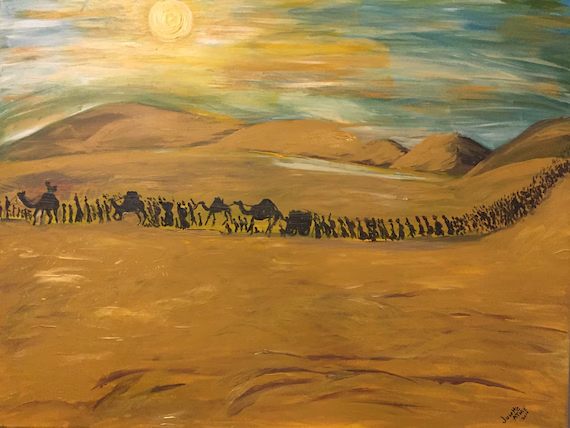Jeremiah the Prophet
Jeremiah lived in Judah. He was called by God to be His prophet.
God told him that he must warn the people of Judah that terrible things would happen to them unless they gave up praying to the false gods and became faithful to the one true God.
Jeremiah was afraid. 'Lord God, he said. 'I'm too young to do this, and I'm no good at speaking in public.
God replied. 'I chose you before you were born. I will tell you what to say, and I will always keep you safe.
The little kingdom of Judah was ruled by King Josiah, but there was always war with his enemies on his borders.
Josiah was killed fighting the Egyptians who were marching north through his land to join the Assyrians in battle against the Babylonians.
Over the years. Jeremiah told the people in Judah again and again what God told him to say, but they took no notice.
One day, he went to a potter and watched him shape a clay pot on his wheel. When the pot became lopsided, the potter squashed the clay into a lump, and began to make the pot again.
The people in the house stared at Jesus, amazed and a little frightened.
They had never seen anything like this before.
Very excited, they whispered to each other and said prayers of praise to God.
God said to Jeremiah; 'The people of Israel are like clay in My hands. I can destroy them if they persist in doing evil, but I can remake them if they change their ways.
Jeremiah told the people what God had said to him, but still they wouldn't listen.
Another time, Jeremiah stood in front of the Temple in Jerusalem. He shouted to the people. 'God says if you won't listen to Him and obey His laws.
He will destroy the Temple and the city of Jerusalem. The priests in the Temple were so angry with Jeremiah, they had him beaten and put in prison.
Jeremiah couldn't speak to the people then, but he could write to them. He spent many hours writing to the King of Judah, but the King threw the parchment on the fire.
So Jeremiah wrote it all out again, but it was no use.
A man named Ebedmelech, who worked in the King's palace, asked for permission to rescue Jeremiah.
The King agreed, and Ebedmelech and some men let down ropes into the well, and pulled Jeremiah to safety.
King Zedekiah asked Jeremiah what he should do. 'You must surrender, or Jerusalem will be destroyed, answered Jeremiah.
Zedekiah refused, and tried to escape from the beseiged city. He was captured by the Babylonians, who blinded him, and killed his two sons.
Then he was led in chains to Babylon.
Nebuchadnezzar's army broke through the walls of Jerusalem. They destroyed the King's palace, smashed the Temple and the houses, and set fire to them.
They carried away all the treasure from the Temple, and marched thousands more Israelites in chains back to Babylon.
Jeremiah stayed with the few people who were left. The people of Judah hadn't listened to God's warnings, and now they had been punished.
Jeremiah wrote to the people who were living in exile in Babylon. 'God says, he wrote, He promises that one day He will bring you home.
While you are in exile, you will leam to love Him again. You will remember His laws and do what is right. Look forward to the time when you will return to your own land.
Nebuchadnezzar, the King of the Babylonians, led his army to Jerusalem. He made Zedekiah King of Judah, and took thousands of people prisoner, marching them back to Babylon to work as slaves.
Zedekiah ruled Judah for ten years, and then he rebelled against the Babylonians. Nebuchadnezzar led his army again to beseige Jerusalem.
'If you want to save your lives. you must surrender. Jeremiah told the people; 'God will give Jerusalem to the Babylonians. Some of Zedekiah's officers were furious with Jeremiah.
They put him into a well. There was no water in it, but it was very muddy at the bottom. They left Jeremiah there to die.










Comments
Post a Comment